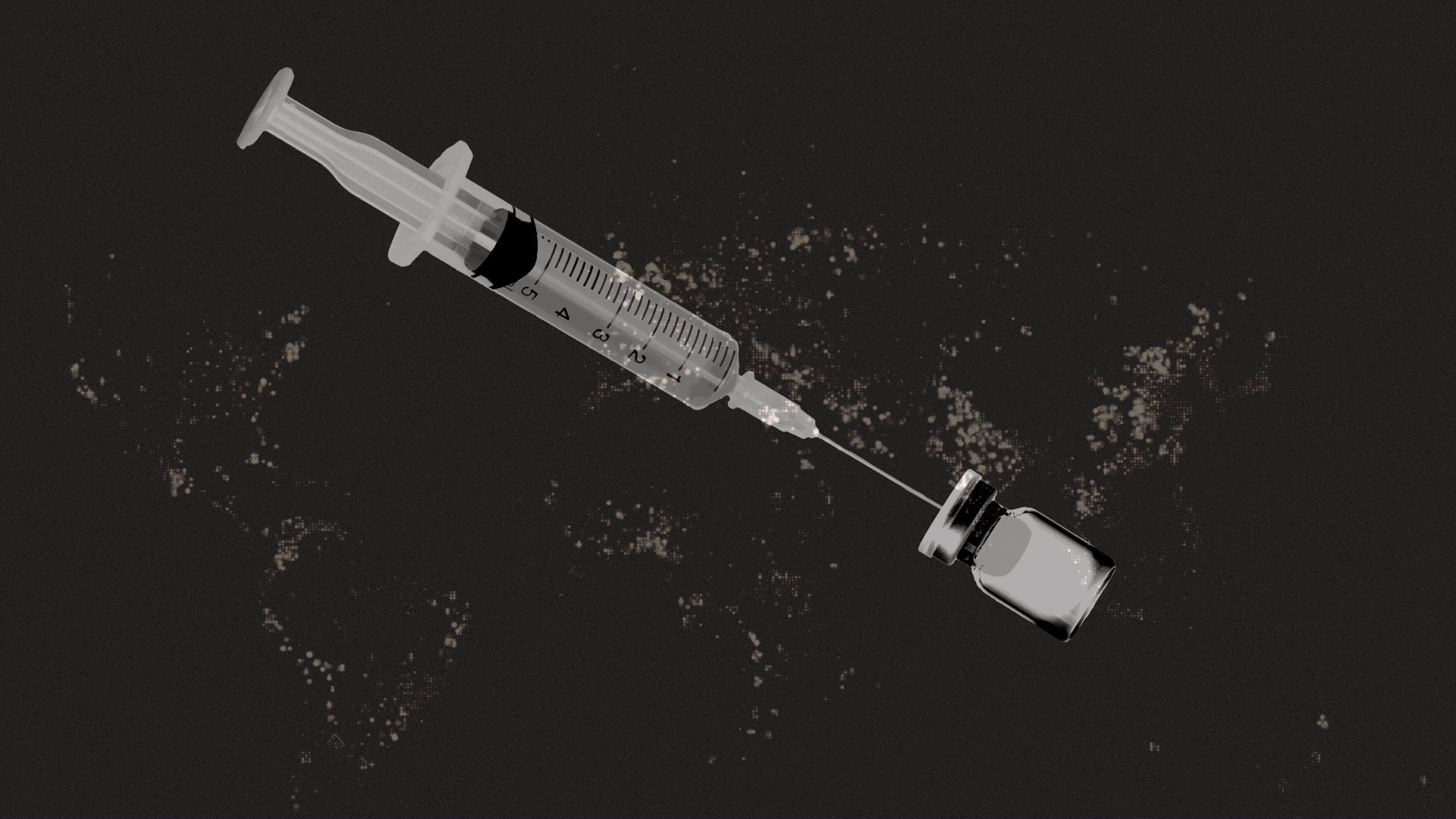A line outside a COVID-19 mobile testing site in New York City's Midtown on Sunday. Angus Mordant/Bloomberg via Getty Images
Experts are bracing for a surge in COVID-19 cases—a “viral blizzard”—as the Omicron variant batters through the population and evades vaccines, which have likely been rendered less effective.“We are looking over our shoulder at an oncoming Omicron surge,” U.S. top doctor Anthony Fauci said. Around the world, Omicron has been detected in at least 89 countries and has spread widely in some of the most vaccinated nations. Hospitalizations are already on the rise in the U.S., and by Saturday the country was averaging about 126,967 new cases a day—up from just 70,000 new cases per day in early November. New York state alone registered 22,000 new infections on Friday, with most reported in New York City. The situation has prompted the cancellation of several events, including the remaining shows for the Rockettes’ iconic Radio City Christmas Spectacular.  Meanwhile, COVID testing stations are struggling with long lines, and over-the-counter rapid antigen tests are more expensive than usual and hard to come by. So far, the U.S. hasn’t implemented new health measures to stave off the virus. According to the World Health Organization, Omicron cases are doubling globally every 1.5 to three days. Fauci warned Christmas-related travel could fuel the spread of COVID-19 even more. It’s a fear that has already inspired countries around the world, including France, Germany, and Israel, to implement new travel restrictions and warnings. “We’re really just about to experience a viral blizzard,” Michael Osterholm, director of the Center for Infectious Disease Research and Policy at the University of Minnesota, told CNN. Osterhold said that in the next three to eight weeks, millions of people will be infected with COVID—either via the Delta variant or the highly contagious Omicron. “We’re not yet sure exactly how that’s going to work out,” he said.One of the more concerning traits of Omicron is its seeming ability to infect people who’ve had two doses of an mRNA vaccine, like Pfizer or Moderna. On Monday, that fear was confirmed when Ugur Sahin, CEO of BioNTech, the German company behind the Pfizer vaccine, told reporters COVID-19 vaccines currently available aren’t able to do enough to combat the variant. “We must be aware that even triple-vaccinated [people] are likely to transmit the disease… It is obvious we are far from 95 percent effectiveness that we obtained against the initial virus,” Sahin said. The severity of Omicron is still unknown. What is known is the vaccines still protect against severe and fatal illness, caused by Omicron or otherwise. According to Sahin, preliminary data out of South Africa, where the first Omicron case was detected, shows that two doses of the Pfizer vaccine decrease the risk of hospitalization by about 70 percent. A booster shot, when a person is eligible, is even better.“The difference between a vaccinated and boosted person who has an infection and someone who has an infection who has never been vaccinated—it’s a major difference with regard to the risk of severity,” Fauci said. “The fully vaccinated are doing much better... The optimum protection is fully vaccinated plus a boost.”Follow Anya Zoledziowski on Twitter.
Meanwhile, COVID testing stations are struggling with long lines, and over-the-counter rapid antigen tests are more expensive than usual and hard to come by. So far, the U.S. hasn’t implemented new health measures to stave off the virus. According to the World Health Organization, Omicron cases are doubling globally every 1.5 to three days. Fauci warned Christmas-related travel could fuel the spread of COVID-19 even more. It’s a fear that has already inspired countries around the world, including France, Germany, and Israel, to implement new travel restrictions and warnings. “We’re really just about to experience a viral blizzard,” Michael Osterholm, director of the Center for Infectious Disease Research and Policy at the University of Minnesota, told CNN. Osterhold said that in the next three to eight weeks, millions of people will be infected with COVID—either via the Delta variant or the highly contagious Omicron. “We’re not yet sure exactly how that’s going to work out,” he said.One of the more concerning traits of Omicron is its seeming ability to infect people who’ve had two doses of an mRNA vaccine, like Pfizer or Moderna. On Monday, that fear was confirmed when Ugur Sahin, CEO of BioNTech, the German company behind the Pfizer vaccine, told reporters COVID-19 vaccines currently available aren’t able to do enough to combat the variant. “We must be aware that even triple-vaccinated [people] are likely to transmit the disease… It is obvious we are far from 95 percent effectiveness that we obtained against the initial virus,” Sahin said. The severity of Omicron is still unknown. What is known is the vaccines still protect against severe and fatal illness, caused by Omicron or otherwise. According to Sahin, preliminary data out of South Africa, where the first Omicron case was detected, shows that two doses of the Pfizer vaccine decrease the risk of hospitalization by about 70 percent. A booster shot, when a person is eligible, is even better.“The difference between a vaccinated and boosted person who has an infection and someone who has an infection who has never been vaccinated—it’s a major difference with regard to the risk of severity,” Fauci said. “The fully vaccinated are doing much better... The optimum protection is fully vaccinated plus a boost.”Follow Anya Zoledziowski on Twitter.
Advertisement

Advertisement
